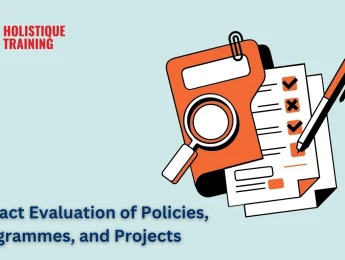A Certified Monitoring & Evaluation Specialist plays a pivotal role in ensuring the effectiveness and efficiency of programs and projects across various sectors. Armed with a deep understanding of monitoring and evaluation methodologies, this specialist is tasked with designing and implementing robust monitoring and evaluation frameworks to assess the progress, impact, and outcomes of initiatives.
They are responsible for collecting, analysing, and interpreting data to provide valuable insights into program performance, identifying areas for improvement, and informing decision-making processes.
They work closely with project teams and stakeholders to develop key performance indicators (KPIs), establish benchmarks, and track progress against predefined targets. Through their expertise, Certified Monitoring & Evaluation Specialists contribute significantly to enhancing accountability, transparency, and the overall success of development initiatives.
Upon completion of this course, participants will be able to:
- Explore monitoring and evaluation theories and methodologies.
- Understand the interconnections among monitoring, reporting, control, audit, research, and evaluation.
- Delve into the essential elements required for an effective monitoring and evaluation system and strategies for its development.
- Examine various methodologies, tools, and techniques essential for implementing and managing a monitoring and evaluation system.
This course is designed for anyone responsible for presenting continuous improvement recommendations achieved through data evaluation and programme monitoring. It would be most beneficial for:
- Department Managers
- Project Managers
- Project Stakeholders
- Data Analysts
- Business Analysts
- Operations Managers
- Finance Managers
- Department Leads
- Risk Assessors
- Change & Control Specialists
This course uses a variety of adult learning styles to aid full understanding and comprehension. Participants will watch videos and participate in trainer-led presentations to fully understand the most appropriate and effective monitoring and continuous evaluation methods for making real-world changes to company processes.
They will work together to understand the different types of feedback, where it could be obtained, and what difference it could make when deciding on project focus. They will also create valuable evaluation plans for change projects to aid company growth and participate in role-playing exercises to present findings back to relevant stakeholders.
Day 5 of each course is reserved for a Q&A session, which may occur off-site. For 10-day courses, this also applies to day 10
Section 1: Monitoring & Evaluation Overview
- Importance and benefits of monitoring and evaluation.
- Key principles and approaches in M&E.
- Role of M&E in project management.
- Understanding the M&E cycle.
- Developing M&E frameworks and indicators.
- Data collection methods and tools in M&E.
- Analysis and interpretation of M&E data.
- Utilising M&E findings for decision-making.
- Challenges and best practices in M&E implementation.
Section 2: Process Monitoring Across a Logical Framework
- Understanding the logical framework approach (LFA).
- Integrating process monitoring into LFA.
- Identifying key stages and activities in process monitoring.
- Developing indicators for process monitoring.
- Establishing monitoring systems and tools for each stage.
- Implementing continuous monitoring techniques.
- Analysing process monitoring data for improvement.
- Adapting monitoring strategies to changing contexts.
- Addressing challenges in process monitoring.
Section 3: The Most Efficient Monitoring & Evaluation Tools
- Selection criteria for M&E tools.
- Utilising technology for data collection and analysis.
- Introduction to data visualisation tools.
- Implementing surveys and questionnaires effectively.
- Using management information systems for M&E.
- Assessing the effectiveness of different M&E tools.
- Integrating participatory approaches into tool selection.
- Customising tools for specific project needs.
Section 4: Monitoring & Evaluation Using Valuable Data
- Importance of valuable data in monitoring and evaluation.
- Identifying sources of valuable data for M&E.
- Data collection methods and techniques.
- Qualitative vs. quantitative data and their values.
- Data validation and quality assurance processes.
- Utilising qualitative and quantitative data in M&E.
- Data analysis for actionable insights.
- Incorporating stakeholder feedback into M&E processes.
- Uncovering pain points in already functioning processes.
- Data-driven decision-making in project management.
- Communicating M&E findings effectively.
Section 5: Presenting Findings & Continuous Improvement Recommendations
- Effective presentation techniques for M&E findings.
- Data visualisation for clear communication.
- Remote presenting and its implications for your project.
- Tailoring findings to different stakeholders.
- Incorporating feedback into presentations.
- Strategies for engaging stakeholders in improvement discussions.
- Identifying areas for continuous improvement.
- Developing actionable recommendations.
- Implementing and tracking improvement initiatives.
- Monitoring progress towards goals.
- Iterative process improvement methodologies.
Upon successful completion of this training course, delegates will be awarded a Holistique Training Certificate of Completion. For those who attend and complete the online training course, a Holistique Training e-Certificate will be provided.
Holistique Training Certificates are accredited by the British Assessment Council (BAC) and The CPD Certification Service (CPD), and are certified under ISO 9001, ISO 21001, and ISO 29993 standards.
CPD credits for this course are granted by our Certificates and will be reflected on the Holistique Training Certificate of Completion. In accordance with the standards of The CPD Certification Service, one CPD credit is awarded per hour of course attendance. A maximum of 50 CPD credits can be claimed for any single course we currently offer.
- Course Code PO4-125
- Course Format Classroom, Online,
- Duration 5 days











